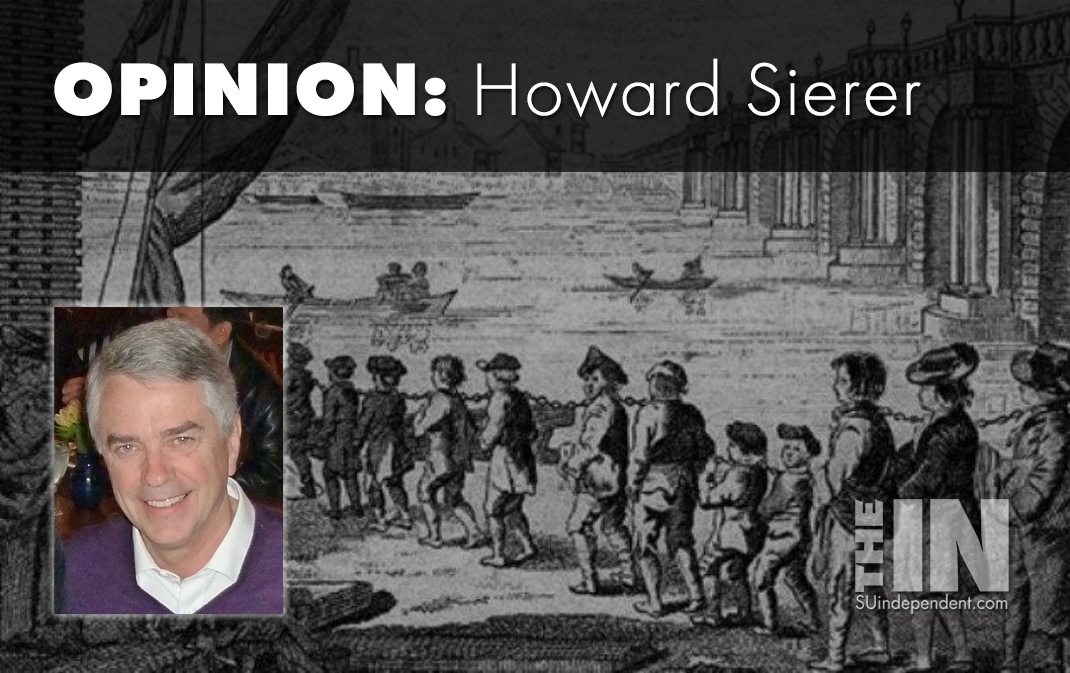
Indentured Servitude Alive and Well
Indentured servitude is a form of labor in which a person agrees to work without salary for a specific number of years for eventual compensation. In spite of the United Nations’ Universal Declaration of Human Rights and our Constitution’s 13th Amendment, it’s still practiced widely and openly in this country, forcing a select set of our citizens to labor for the monetary benefit of others.
I’m referring of course to college athletes held under the thumb of the National Collegiate Athletic Association.
To implement its amateur ideals, the NCAA has a variety of rules and regulations that limit athlete financial aid to the “full cost of attendance” plus a few minor ups and extras. It argues that college sports are “an unusual product” and should not be subject to federal antitrust laws since the athletes’ amateur status is part of the appeal to consumers.
Meanwhile, the NCAA negotiates highly lucrative contracts with television networks for broadcasting football and basketball games, including this weekend’s men’s and women’s college basketball championships. Football and men’s basketball alone will generate about $1.5 billion for member schools in 2021. Add to that corporate sponsorships for the “NCAA’s official this-or-that” and the NCAA as a business proposition is doing quite well with its indentured employees.
Where does the money go? A significant amount goes for financial support to men’s and women’s sports that don’t cover their cost of operations: swimming, track, soccer, field hockey, etc. More flows into world-class stadiums, training rooms, and the like.
Elite college coaches are paid $9 million salaries, and earn millions more from national and local advertising and public appearance fees. Compare that to what amounts to room and board for their athletes.
Unsurprisingly, some athletes and their attorneys have been taking the NCAA to court. If you’ll pardon the sports analogy, they’ve applied a full-court press in the last year or two.
As a result, lower courts have allowed college athletes additional benefits such as laptop computers, musical instruments, study-abroad programs, internships, and paid-for graduate school. But those decisions didn’t address the NCAA’s limits on compensation unrelated to education.
The Biden Justice Department, following the Trump administration’s lead before it, has warned the NCAA of possible antitrust litigation related to athlete compensation.
Sensing a popular cause, Congress and various state legislatures have taken the baton (sorry, another sports analogy) and introduced legislation to expand athletes’ rights to compensation. First, out of the starting blocks (another sports analogy), California passed a law in 2019 allowing its college athletes to be compensated when their name, image, or likeness is used commercially. It doesn’t take effect until January 2023 allowing the NCAA time to comply or challenge. Some 30 states are considering similar legislation.
Interestingly, free-market Republicans, including our own Sen. Romney, have expressed support for federal legislation as have liberal Democrats who see it as a civil rights or labor issue. Romney wants universities to compensate athletes directly.
While I often champion states rights, in this case, a federal law would prevent a hodgepodge of state laws where different schools in the same conference would be constrained by differences enacted by their respective legislatures.
Since men’s football and basketball are the only sports that generate income far beyond their costs, will female athletes be left out in the cold? I’ve argued in favor of higher compensation for the U.S. women’s Olympic soccer team so I’m happy to report that market forces will probably ensure those female college athletes will be compensated as well.
For example, Lilly King won two gold medals at the 2016 Rio Olympic Games after her freshman year at Indiana University. She says, “I lost a lot of money due to the fact that I basically…decided to stay [in college] and get my education and also swim for my college team.” She turned down “at least $100,000” in bonus money.
Labor economist Andy Schwarz claims, “People are under-marketing the star performing ability of female athletes, ignoring the fact that there will be star female athletes who will make decent money, and their value is highest while still in college.”
Granting college athletes a chance to make money selling their name, image and likeness will open the floodgates, especially for big-name players on the national stage. But even local heroes might earn some spending money appearing in local business ads or attending an alumna daughter’s birthday party.
I’m all in for paying college athletes directly, whatever the market will bear. Instead of millions flowing to coaches and glitzy training facilities, today’s indentured servants would reap the benefit of their labors. Those suffering a career-ending college injury would have at least some rewards.
To make this work, I envision college professional athletic conferences either as an adjunct to or outside the NCAA. Schools that wanted to compete in what would amount to professional minor leagues in football and basketball would form new conferences across the country and like today’s professional leagues, would enter into some television revenue sharing arrangement.
The rest of college athletics would return to the scholar-athlete model upon which today’s college athletics were built.
College English majors can write and sell books. Science and engineering students can patent inventions and get paid for summer jobs with future employers. All students other than athletes can tutor or otherwise apply the skills they are learning to “work their way” through college.
It’s time to free the indentured servants of college athletics.



